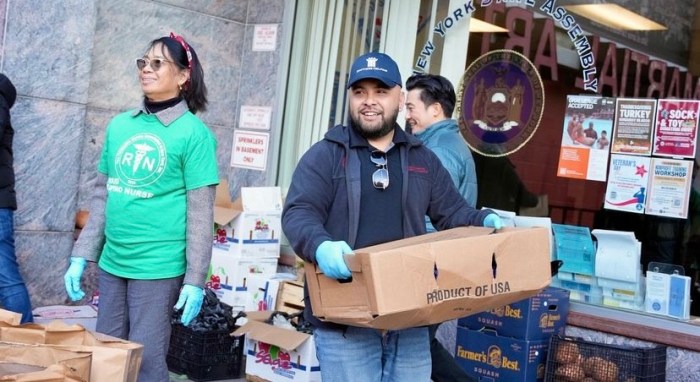Congresswoman Alexandria Ocasio-Cortez revisited her bartending days in a Friday event with the Restaurant Opportunities Center United to promote a federal law that will raise the minimum wage for tipped wage earners.
As if to add insult to injury, the organizers of the event also chose the Queensboro at 80-02 Northern Blvd as the host, which served as the venue for Joe Crowley’s victory party the night the Queens “king-maker” was toppled by Ocasio-Cortez.
The location was a different restaurant at the time.
Ocasio-Cortez, slinging drinks for patrons, highlighted the hardships of depending on tips as a main source of income as a bartender herself just months before winning the June 2018 primary.
“I worked in restaurants for four years … When we talk about the need for a fair wage, it is so real the amount of exploitation and harassment and labor violations that you will endure for [benefits] of tipped work,” Ocasio-Cortez said. “It is not enough to just be a land of freedom, but we have to live up to that value. We have to be a land of economic freedom.”
Ocasio-Cortez described her experience joining the restaurant industry after graduating college as a prospect more stable than other jobs that required a four-year degree, but the “economic desperation” of needing to take shifts that ended at 3 a.m. in order to make rent was difficult to cope with.
The Raise the Wage Act, which Ocasio-Cortez is sponsoring, aims to bring the federal minimum to $15 in an attempt to follow seven states across the country that have mandated that employers of tipped wage earners meet the state wage standards.
According to ROC United, this will mean restaurant workers, a majority of whom are women of color, will no longer depend on customers for their income. The organization claims this will free not only servers, but also nail salon technicians and car wash attendants from obligations to accept negative treatment, discrimination and even sexual harassment.
Other speakers at the event also explained how they often get sexually harassed by customers and employers.
One server who identified herself as Aisha, a single mom, works as both a massage therapist and waitress. But while she is paid well enough to save some money and enjoys her work, she feels as though her dependency on tips leaves her vulnerable to situations other workers do not have to worry about as much.
“I’ve experienced sexual harassment coworkers, customers and management. I’ve felt pressured for dates. I’ve been asked for my phone number. I’ve had to endure constant sexual jokes, suggestive looks and gestures,” Aisha said. “Because I’m paid largely through tips, a manager has even suggested that in order to increase my tips I should wear more makeup.”
Governor Andrew Cuomo made the commitment in December 2017 to see New York through the process of becoming the eighth state in the union to adopt a policy that tipped workers must meet the minimum wage in early 2018 during his State of the State address.
Although there have been hearings and other deliberations on how to implement this, it has not been put into effect despite Cuomo mandating a $15 minimum wage increase by 2021 in December 2018.





































